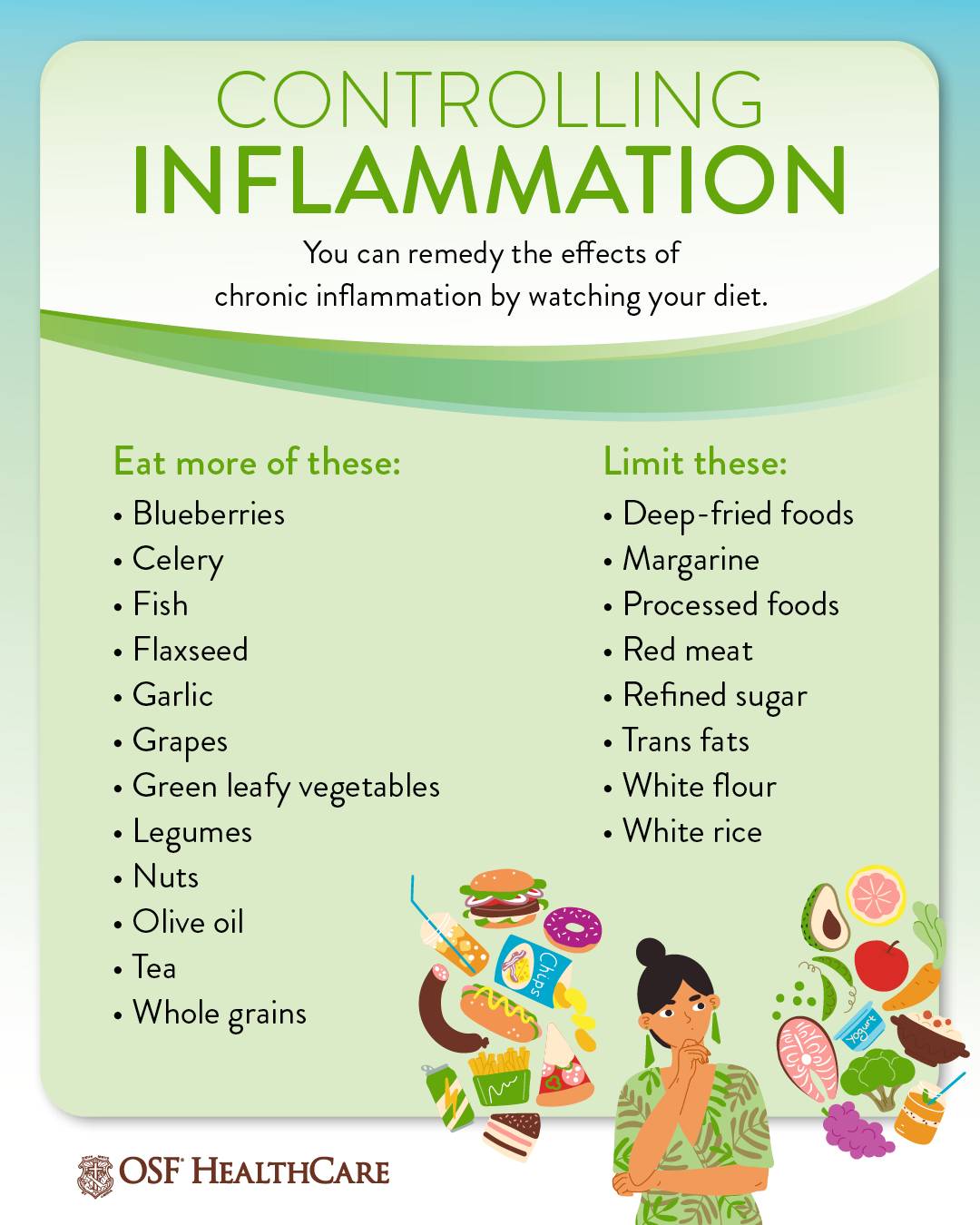6 Steps to Reduce Inflammation in Your Body: A Guide to Better Health
Inflammation is your body’s natural way of defending itself—a bit like an alarm system that alerts you to injuries or infections. While short-term inflammation is essential for healing, sometimes this alarm doesn’t turn off, leading to chronic inflammation. This prolonged state can contribute to health problems like heart disease, diabetes, arthritis, and more. The good news? You can take simple, effective steps to reduce inflammation and keep your body balanced and thriving.
Let’s explore these steps in detail.
1. Fill Your Plate with Fruits and Vegetables
Think of your body as a finely tuned car that needs the best fuel to function. Fruits and vegetables are like premium fuel, providing essential nutrients that combat inflammation and support overall health.
- Why They Work: Packed with antioxidants, vitamins, and minerals, fruits and veggies help neutralize harmful free radicals in your body, reducing oxidative stress—a key contributor to chronic inflammation.
- What to Eat: Brightly colored produce like berries, oranges, spinach, broccoli, and bell peppers are especially effective. Each color represents a unique set of nutrients, so variety is essential.
- How to Incorporate: Aim to fill half your plate with fruits and vegetables at every meal. Snack on carrot sticks or apple slices, and add spinach to smoothies or stir-fries for an easy boost.
2. Choose Whole Grains Over Refined Grains
Imagine building a house. Would you use flimsy materials or sturdy bricks? Whole grains are the sturdy bricks that fortify your body and reduce inflammation.
- Why They Work: Whole grains are rich in fiber, which supports a healthy gut. Since much of your immune system is linked to your gut, improving gut health can directly reduce inflammation. Fiber also helps regulate blood sugar levels, preventing spikes that can trigger inflammation.
- What to Eat: Opt for brown rice, quinoa, whole wheat bread, oatmeal, and barley. These options are unprocessed and retain their natural nutrients.
How to Incorporate: Replace white bread with whole wheat, swap white rice for brown or wild rice, and choose steel-cut oats for breakfast. Aim for at least half of your daily grain intake to come from whole grains.
3. Include Healthy Fats in Your Diet
Healthy fats are like the oil that keeps a machine running smoothly—they ensure your body functions optimally and reduce inflammation.
- Why They Work: Omega-3 fatty acids, found in certain foods, are potent anti-inflammatory agents. They counteract inflammation-causing omega-6 fatty acids found in processed foods.
- What to Eat: Salmon, mackerel, and sardines are excellent sources of omega-3s. Plant-based options include walnuts, chia seeds, flaxseeds, and avocados. Olive oil is another great choice for cooking or drizzling over salads.
How to Incorporate: Add a handful of walnuts to your oatmeal, drizzle olive oil over roasted vegetables, or include fatty fish in your meals at least twice a week.
4. Make Regular Exercise a Priority
Think of your body as a bicycle—it works best when it’s in motion. Regular physical activity is one of the most effective ways to combat inflammation.
- Why It Works: Exercise promotes circulation, reduces stress hormones, and lowers levels of inflammatory markers in the body. Over time, it strengthens your immune system and enhances your body’s ability to regulate inflammation.
- What to Do: Aim for at least 30 minutes of moderate exercise most days of the week. This can include brisk walking, cycling, swimming, or yoga. Even simple activities like gardening or dancing count!
How to Start: Begin with short, manageable sessions—10 to 15 minutes—and gradually increase as you build stamina. The key is consistency, not intensity.
5. Prioritize Quality Sleep
Sleep is when your body recharges and repairs itself. Think of it as plugging in your phone overnight—without enough charge, things won’t function properly.
- Why It Works: Poor sleep can disrupt your body’s inflammatory responses, leading to higher levels of chronic inflammation. Quality rest allows your body to regulate stress hormones and repair damaged cells.
- How Much to Sleep: Most adults need 7–9 hours of sleep per night. Children and teens require even more.
How to Improve Sleep:
- Create a bedtime routine, like reading or taking a warm bath.
- Avoid screens an hour before bed to reduce blue light exposure.
Keep your bedroom cool, dark, and quiet for optimal sleep conditions.
6. Manage Stress Effectively
Stress is like a tight knot that disrupts your body’s harmony. Chronic stress keeps your body’s inflammation alarm ringing, leading to long-term damage.
- Why It Works: Relaxation techniques lower cortisol levels (your stress hormone) and reduce inflammatory markers. Managing stress also improves mental health, which is closely linked to physical well-being.
How to Manage Stress:
- Practice deep breathing exercises: Inhale deeply for four counts, hold for four, and exhale for six.
- Explore mindfulness or meditation to quiet your mind.
- Spend time in nature, listen to soothing music, or engage in hobbies you love.
Pro Tip: Journaling can also be a great outlet to process thoughts and reduce stress.
Small Changes, Big Impact
Reducing inflammation isn’t about overhauling your life overnight—it’s about making small, consistent changes that add up over time. Start by incorporating one or two of these steps into your daily routine, and gradually build from there.
By eating more nutrient-dense foods, staying active, prioritizing rest, and managing stress, you’re giving your body the tools it needs to heal and thrive. Not only will these habits reduce inflammation, but they’ll also enhance your overall health and quality of life.
Remember, progress is more important than perfection. Celebrate every positive change you make, no matter how small—it’s a step toward a healthier, happier you!




No comments yet
Be the first to share your thoughts!